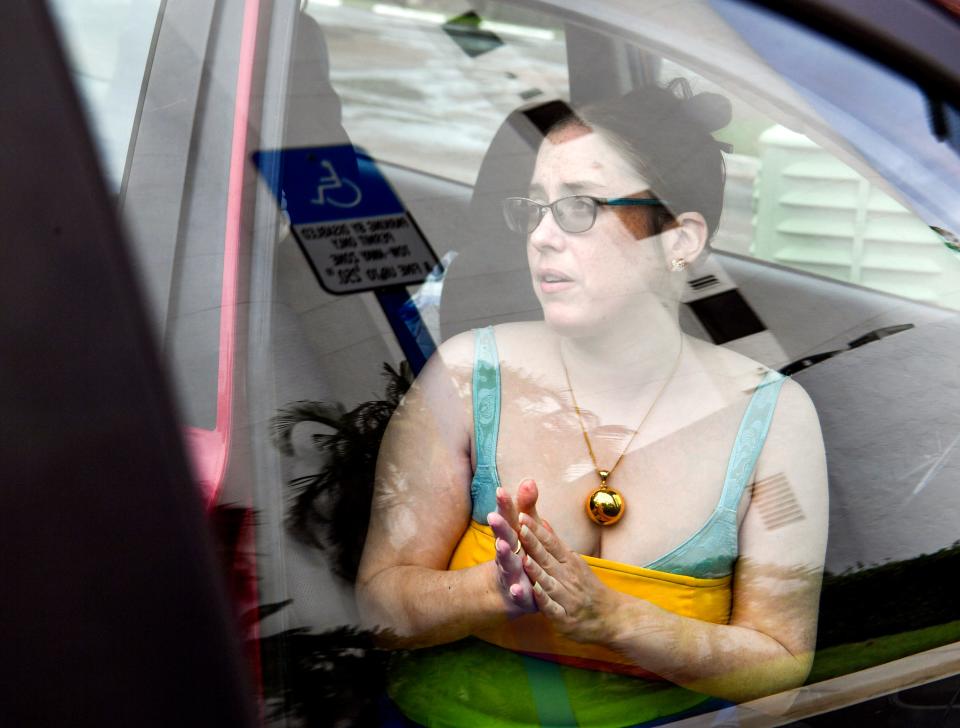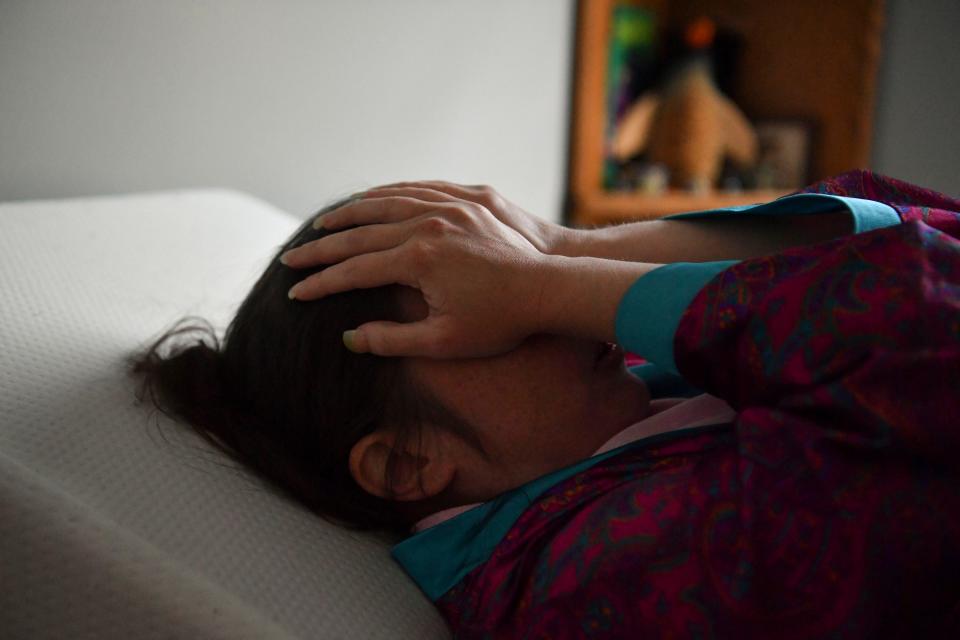'I knew I wasn't right.' How long COVID inflicted pain, trauma to Stuart woman, 41
Imagine being stuck in bed, utterly exhausted and forced to live in total darkness because your body can’t tolerate light. The slightest sounds can cause writhing pain.
That was Rebecca Schleider’s life in Ohio for several months in 2020 during her first prolonged illness from COVID-19, before she recovered enough to move to Stuart, Florida, with her fiancé in January 2022.
“It’s not like you’re blind; any light is painful, any sound is painful,” the 41-year-old said, as if retelling a scary dream. “I just existed in darkness.”
Now, as a COVID long-hauler, Schleider starts each day with a brief meditation before rising slowly to allow her blood pressure to increase as her body wakes up.
She then paces her movements: Start a load of laundry, rest. Fold some clothes, rest again. Chop vegetables for soup, take another break.
“I try to accomplish tasks as much as I can. I’ve found that pacing with television commercials is pretty good for me,” said Schleider, who can’t stand for extended periods without feeling fatigued.
It’s been her reality for nearly three years as she manages a diagnosis of post-acute sequelae of SARS-CoV-2 infection, commonly called long COVID.
She’s grappled with a range of medical conditions after contracting COVID twice: first in March 2020 – before reliable testing or vaccines existed. She got sick again in August 2022 working part time in Stuart, after being vaccinated and double boosted.
“The first was horrific,” Schleider said. “The second time was still enough to severely disable me.”
What is long COVID and who gets it?
Millions of Americans are COVID long-haulers, suffering with life-altering symptoms that endure for months or even years after an initial infection. Their different experiences present a challenge to help people with a condition that creates profound and varied problems.
Symptoms of long COVID vary from person to person, according to the Centers for Disease Control and Prevention.
There’s no firm data on how many people continue to suffer after a year or more, or are permanently disabled because of long COVID. U.S. estimates suggest somewhere between 7 million and 23 million Americans have the condition.

In a study released in May funded by the National Institutes of Health, researchers identified symptoms that are the most distinctive to long COVID, including: fatigue, especially after exercise; brain fog; dizziness; gastrointestinal symptoms; heart palpitations; issues with sexual desire or capacity; loss of smell or taste; thirst; chronic cough; chest pain; and abnormal movements.
Treatment strategies are based on patients’ specific symptoms and may include existing therapeutics, such as steroids or anti-inflammatory medication. Trials are underway to test new therapeutics for long COVID patients.
Medical records Schleider provided to TCPalm show her long COVID diagnosis has involved chronic fatigue syndrome, tachycardia (increased heart rate) and “extreme exertion malaise,” which the CDC describes as “the worsening of symptoms following even minor physical or mental exertion.”
She also experiences postural orthostatic tachycardia syndrome, known as POTS, which affects involuntary nervous system functions, such as heart rate and blood pressure, usually upon standing from a reclining position.
First exposure
Schleider had asthma when she first got sick, but being 39 and in reasonably good health, she expected to fully recover. She felt fatigue with low oxygen levels, but she was never hospitalized.
Still, her illness dragged on.
Baffled, she hunted online for information and found others like herself, sick with long COVID and sharing their stories.
“I knew I wasn’t right,” she said. “I was starting to slow down mentally and … getting confused very easily.”
Just walking into a doctor’s office triggered a crash episode that spiraled into a months-long ordeal.
“I just declined and declined,” she said. “That’s the crash that put me in the dark.”
She experienced photophobia in both eyes, defined as an “abnormal sensitivity to light,” that causes pain in the eyes or head. She was bed-bound and so weak she could barely stand.

For months, her fiancé, Scott Simmons, a philosophy professor at Indian River State College, cared for her. She had a medical buzzer to push when she needed help.
“I would have to run around the apartment, shut all the blinds and turn off all the lights so she could handle walking into the hallway,” Simmons said. “About a 3-foot span to the bathroom.”
They were realizing how terrible her illness could become.
“We started contacting a dozen or more doctors,” he said. “And each doctor you talk to opens up another door to another specialist.”
Schleider in Ohio was treated at Cleveland Clinic’s ReCOVer Clinic, a multi-disciplinary medical center for people diagnosed with long COVID.
Dr. Lyssette Cardona, the department chair of infectious diseases at Cleveland Clinic Martin Health in Stuart, said via email that long COVID patients are evaluated to exclude other medical conditions and then are referred to appropriate specialists for symptom management and follow-up care.
Doctors in Florida, Cardona noted, may also consult with colleagues at ReCOVer Clinic, which accepts patients from all over the country.
Battle for disability benefits
According to the U.S. Government Accountability Office, at least 1 million people with long COVID are out of work because of it.
That includes Schleider, who hasn’t worked since August 2022, when her illness forced her to quit a part-time retail job.
In Ohio, she worked at a bank and a grocery store, putting in about 60 hours a week before she fell ill during the first wave of the pandemic.
“I had a high-intensity job with a bank where I had recently been promoted and I was very successful,” Schleider said. “I got a lot of awards with that.”
And for fun, she was teaching herself Korean before going off to work.
“I’m a nerd like that,” she said.
Being a long-hauler not only ended the work life she once enjoyed, she has struggled to maintain health insurance. She applied for disability coverage through the Social Security Administration in Ohio, but she was denied, despite having two qualifying medical conditions, she said.
According to the U.S. Department of Health and Human Services, long COVID may be considered a disability under the Americans with Disabilities Act if it substantially limits one or more major life activities.
Schleider is appealing her disability denial before an administrative law judge seated in West Palm Beach.
The challenge, she said, is while long COVID may qualify as an ADA disability, there’s no definitive way to diagnose it.
“You kind of have to believe doctors and believe patients who say they’re disabled. But judges like objective testing,” Schleider said. “And being very, very sick makes it harder to go about doing the work of proving you’re disabled.”
She’s undergoing more medical tests and searching for an attorney to help with her appeal.
“Applying for disability has utterly destroyed my mental health,” she said.
Living as a COVID long-hauler

Surviving COVID has been so traumatizing, Schleider said she’s received treatment for post-traumatic stress disorder.
“My PTSD is a lot better than it was,” she said.
She’s still blessed, she said, because through it, Simmons and her family and friends trusted her word with an unwavering faith as she’s endured the fear and frustration of an uncertain future.
She’s hopeful, too, that better treatments are coming for all long COVID patients.
“I know they’re coming; I look forward to more healing,” Schleider said. “But I try not to place the expectation of a day when I am healed, because that day may not come.”
USA TODAY contributed to this report.
Melissa E. Holsman is the legal affairs reporter for TCPalm and Treasure Coast Newspapers and is writer and co-host of "Uncertain Terms," a true-crime podcast. Reach her at melissa.holsman@tcpalm.com. If you are a subscriber, thank you. If not, become a subscriber to get the latest local news on the Treasure Coast.

This article originally appeared on Treasure Coast Newspapers: Long COVID illness becomes 3-year struggle for Stuart, Florida, woman

